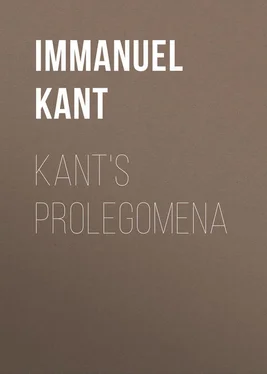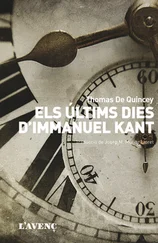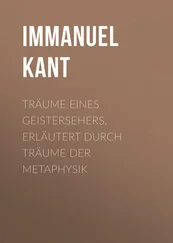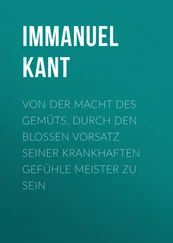Immanuel Kant - Kant's Prolegomena
Здесь есть возможность читать онлайн «Immanuel Kant - Kant's Prolegomena» — ознакомительный отрывок электронной книги совершенно бесплатно, а после прочтения отрывка купить полную версию. В некоторых случаях можно слушать аудио, скачать через торрент в формате fb2 и присутствует краткое содержание. Издательство: Иностранный паблик, Жанр: Философия, foreign_antique, foreign_prose, на английском языке. Описание произведения, (предисловие) а так же отзывы посетителей доступны на портале библиотеки ЛибКат.
- Название:Kant's Prolegomena
- Автор:
- Издательство:Иностранный паблик
- Жанр:
- Год:неизвестен
- ISBN:нет данных
- Рейтинг книги:5 / 5. Голосов: 1
-
Избранное:Добавить в избранное
- Отзывы:
-
Ваша оценка:
- 100
- 1
- 2
- 3
- 4
- 5
Kant's Prolegomena: краткое содержание, описание и аннотация
Предлагаем к чтению аннотацию, описание, краткое содержание или предисловие (зависит от того, что написал сам автор книги «Kant's Prolegomena»). Если вы не нашли необходимую информацию о книге — напишите в комментариях, мы постараемся отыскать её.
Kant's Prolegomena — читать онлайн ознакомительный отрывок
Ниже представлен текст книги, разбитый по страницам. Система сохранения места последней прочитанной страницы, позволяет с удобством читать онлайн бесплатно книгу «Kant's Prolegomena», без необходимости каждый раз заново искать на чём Вы остановились. Поставьте закладку, и сможете в любой момент перейти на страницу, на которой закончили чтение.
Интервал:
Закладка:
Should my reader complain of the difficulty and the trouble which I occasion him in the solution of this problem, he is at liberty to solve it himself in an easier way. Perhaps he will then feel under obligation to the person who has undertaken for him a labor of so profound research, and will rather be surprised at the facility with which, considering the nature of the subject, the solution has been attained. Yet it has cost years of work to solve the problem in its whole universality (using the term in the mathematical sense, viz., for that which is sufficient for all cases), and finally to exhibit it in the analytical form, as the reader finds it here.
All metaphysicians are therefore solemnly and legally suspended from their occupations till they shall have answered in a satisfactory manner the question, "How are synthetic cognitions a priori possible?" For the answer contains which they must show when they have anything to offer in the name of pure reason. But if they do not possess these credentials, they can expect nothing else of reasonable people, who have been deceived so often, than to be dismissed without further ado.
If they on the other hand desire to carry on their business, not as a science, but as an art of wholesome oratory suited to the common sense of man, they cannot in justice be prevented. They will then speak the modest language of a rational belief, they will grant that they are not allowed even to conjecture, far less to know, anything which lies beyond the bounds of all possible experience, but only to assume (not for speculative use, which they must abandon, but for practical purposes only) the existence of something that is possible and even indispensable for the guidance of the understanding and of the will in life. In this manner alone can they be called useful and wise men, and the more so as they renounce the title of metaphysicians; for the latter profess to be speculative philosophers, and since, when judgments a priori are under discussion, poor probabilities cannot be admitted (for what is declared to be known a priori is thereby announced as necessary), such men cannot be permitted to play with conjectures, but their assertions must be either science, or are worth nothing at all.
It may be said, that the entire transcendental philosophy, which necessarily precedes all metaphysics, is nothing but the complete solution of the problem here propounded, in systematical order and completeness, and hitherto we have never had any transcendental philosophy; for what goes by its name is properly a part of metaphysics, whereas the former science is intended first to constitute the possibility of the latter, and must therefore precede all metaphysics. And it is not surprising that when a whole science, deprived of all help from other sciences, and consequently in itself quite new, is required to answer a single question satisfactorily, we should find the answer troublesome and difficult, nay even shrouded in obscurity.
As we now proceed to this solution according to the analytical method, in which we assume that such cognitions from pure reasons actually exist, we can only appeal to two sciences of theoretical cognition (which alone is under consideration here), pure mathematics and pure natural science (physics). For these alone can exhibit to us objects in a definite and actualisable form ( in der Anschauung ), and consequently (if there should occur in them a cognition a priori ) can show the truth or conformity of the cognition to the object in concreto , that is, its actuality, from which we could proceed to the reason of its possibility by the analytic method. This facilitates our work greatly for here universal considerations are not only applied to facts, but even start from them, while in a synthetic procedure they must strictly be derived in abstracto from concepts.
But, in order to rise from these actual and at the same time well-grounded pure cognitions a priori to such a possible cognition of the same as we are seeking, viz., to metaphysics as a science, we must comprehend that which occasions it, I mean the mere natural, though in spite of its truth not unsuspected, cognition a priori which lies at the bottom of that science, the elaboration of which without any critical investigation of its possibility is commonly called metaphysics. In a word, we must comprehend the natural conditions of such a science as a part of our inquiry, and thus the transcendental problem will be gradually answered by a division into four questions:
It may be seen that the solution of these problems, though chiefly designed to exhibit the essential matter of the Critique, has yet something peculiar, which for itself alone deserves attention. This is the search for the sources of given sciences in reason itself, so that its faculty of knowing something a priori may by its own deeds be investigated and measured. By this procedure these sciences gain, if not with regard to their contents, yet as to their proper use, and while they throw light on the higher question concerning their common origin, they give, at the same time, an occasion better to explain their own nature.
FIRST PART OF THE TRANSCENDENTAL PROBLEM
HOW IS PURE MATHEMATICS POSSIBLE?
§ 6. HERE is a great and established branch of knowledge, encompassing even now a wonderfully large domain and promising an unlimited extension in the future. Yet it carries with it thoroughly apodeictical certainty, i.e., absolute necessity, which therefore rests upon no empirical grounds. Consequently it is a pure product of reason, and moreover is thoroughly synthetical. [Here the question arises:]
"How then is it possible for human reason to produce a cognition of this nature entirely a priori ?"
Does not this faculty [which produces mathematics], as it neither is nor can be based upon experience, presuppose some ground of cognition a priori , which lies deeply hidden, but which might reveal itself by these its effects, if their first beginnings were but diligently ferreted out?
§ 7. But we find that all mathematical cognition has this peculiarity: it must first exhibit its concept in a visual form ( Anschauung ) and indeed a priori , therefore in a visual form which is not empirical, but pure. Without this mathematics cannot take a single step; hence its judgments are always visual, viz., "intuitive"; whereas philosophy must be satisfied with discursive judgments from mere concepts, and though it may illustrate its doctrines through a visual figure, can never derive them from it. This observation on the nature of mathematics gives us a clue to the first and highest condition of its possibility, which is, that some non-sensuous visualisation (called pure intuition, or reine Anschauung ) must form its basis, in which all its concepts can be exhibited or constructed, in concreto and yet a priori . If we can find out this pure intuition and its possibility, we may thence easily explain how synthetical propositions a priori are possible in pure mathematics, and consequently how this science itself is possible. Empirical intuition [viz., sense-perception] enables us without difficulty to enlarge the concept which we frame of an object of intuition [or sense-perception], by new predicates, which intuition [i.e., sense-perception] itself presents synthetically in experience. Pure intuition [viz., the visualisation of forms in our imagination, from which every thing sensual, i.e., every thought of material qualities, is excluded] does so likewise, only with this difference, that in the latter case the synthetical judgment is a priori certain and apodeictical, in the former, only a posteriori and empirically certain; because this latter contains only that which occurs in contingent empirical intuition, but the former, that which must necessarily be discovered in pure intuition. Here intuition, being an intuition a priori , is before all experience , viz., before any perception of particular objects, inseparably conjoined with its concept.
Читать дальшеИнтервал:
Закладка:
Похожие книги на «Kant's Prolegomena»
Представляем Вашему вниманию похожие книги на «Kant's Prolegomena» списком для выбора. Мы отобрали схожую по названию и смыслу литературу в надежде предоставить читателям больше вариантов отыскать новые, интересные, ещё непрочитанные произведения.
Обсуждение, отзывы о книге «Kant's Prolegomena» и просто собственные мнения читателей. Оставьте ваши комментарии, напишите, что Вы думаете о произведении, его смысле или главных героях. Укажите что конкретно понравилось, а что нет, и почему Вы так считаете.












